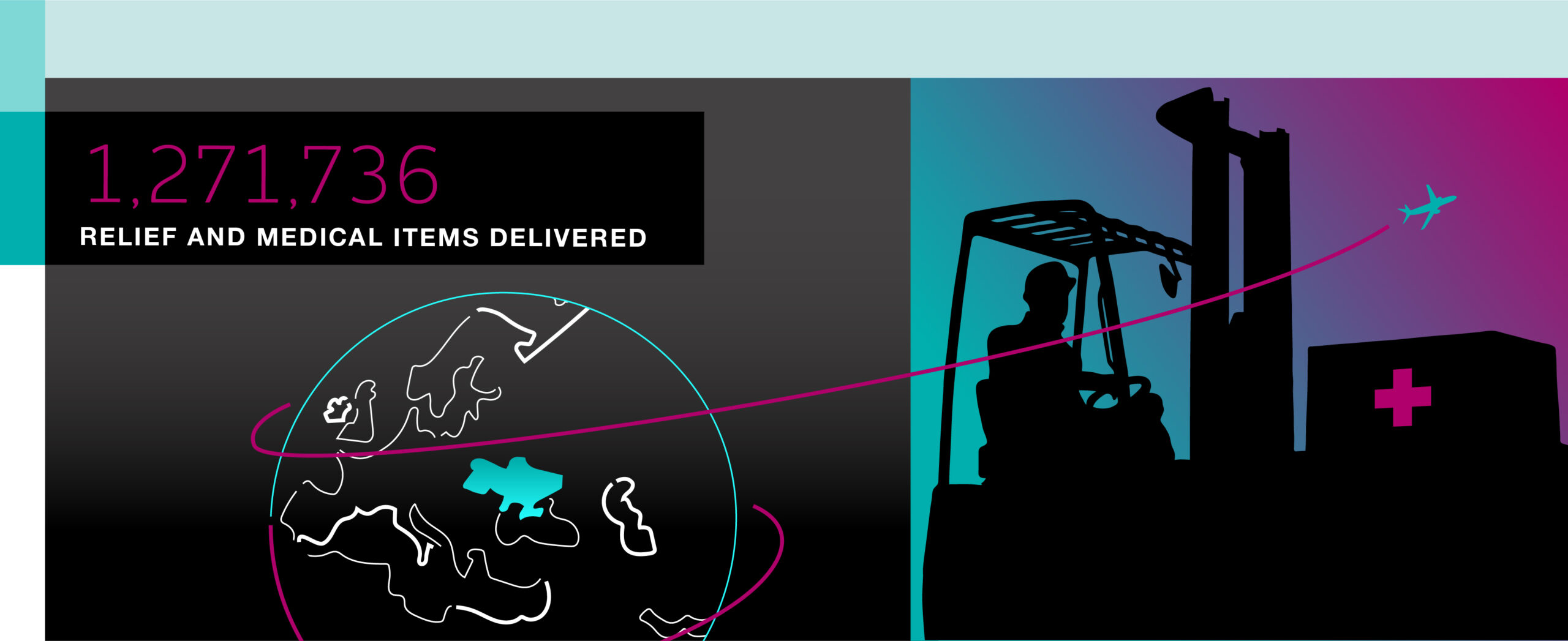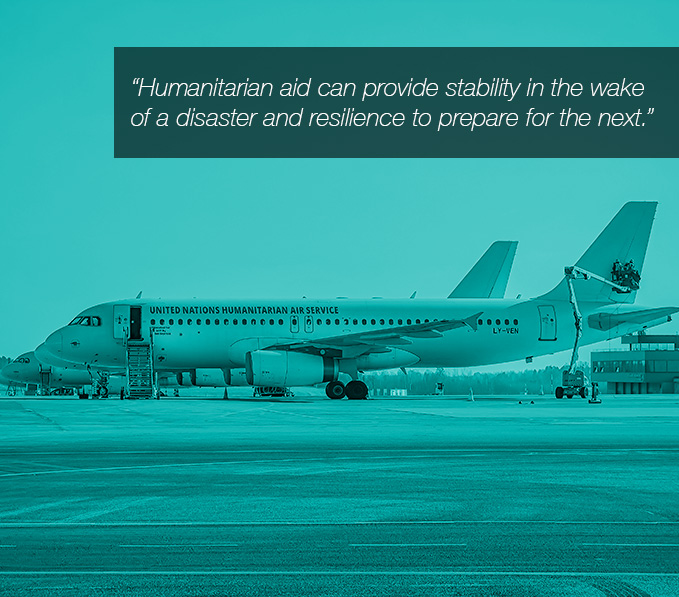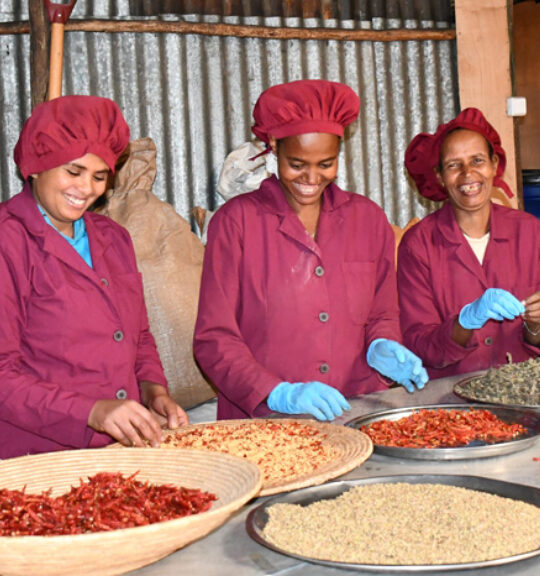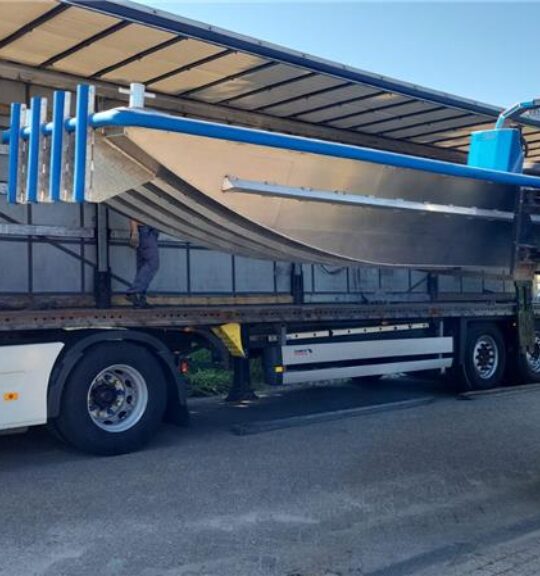Our Impact


Headlines in 2023 were dominated by conflict and natural disasters. From Ukraine to Palestine, the global community mobilised in response to some of the most significant humanitarian and refugee crises in recent memory. Coupled with global political instability, the effects of climate change, economic downturns, extreme weather events and ongoing population shifts, the need for humanitarian relief is acute across the globe.
Whatever the reason, the stakes are the same: human lives by the millions.
From COVID-19 vaccines and personal protective equipment to hygiene kits and modular homes, our humanitarian teams delivered over 1.2 million items of medical equipment and supplies in 2023 and have responded to crises around the world.
Ultimately, the humanitarian aid our teams provide around the world is focused on saving lives. But it’s more than that. For the family who loses their home to conflict, aid provides them with basic necessities, ensuring they have access to food, clean water, shelter, and medical care, which are often scarce in the midst of emergencies.
For communities displaced by a natural disaster and living in tight quarters or temporary housing, humanitarian aid can help reduce the chances of disease outbreaks. Humanitarian aid, when done right, provides stability in the wake of a disaster and resilience to prepare for the next.
Responding in the Wake of Crises
In 2023, our Humanitarian and Stabilisation Operations Team, which works on behalf of the UK Government, worked along the UK to respond to ten emergency crises and deployed teams to more than 40 countries to respond to and assist with humanitarian issues.
On 6 February, a major earthquake hit south-east Türkiye, affecting 10 cities and the north-west region of Syria. Later that day, a second major earthquake occurred. The UK government responded immediately to the Turkish government’s requests for humanitarian support, and also worked with the United Nations and other partner organisations to respond to the emergency in Syria. Tens of thousands of people were killed and more injured. Thousands of buildings collapsed, leaving countless people exposed to harsh winter conditions. Schools and hospitals were obliterated.
The Humanitarian and Stabilisation Operations Team’s response following the earthquakes drew on all of the team’s capabilities. The Horizon Scanning and Early Warning duty system alerted the Humanitarian Response Group of the earthquake within 30 minutes of the event and positioned the UK’s Foreign, Commonwealth and Development Office (FCDO) to get a timely start on responding. In the early hours of the morning, the team activated an experienced humanitarian response team bringing leadership but also ability to troubleshoot at pace.
Technical expertise was provided as part of the early response, helping to shape strategy, and publish an Earthquake Q&A, which answered key questions about why the earthquake occurred and potential for aftershocks. The communications liaison function was engaged early and supported communication and media during the response, including liaising with various parts of the FCDO comms team.
Throughout the initial month after the earthquakes, the team managed the movement of cargo across four Royal Airforce flights and seven air charter flights offered by Turkish Airlines from the UK and Dubai to Türkiye, alongside arranging the return of equipment by truck and the delivery of core relief items to response partner CARE.
Timely and Safe Delivery
On the other side of the world, our Humanitarian Logistics Capability (HLC) team supports the Australian Government across the Pacific and beyond, including managing the largest humanitarian warehouse in the Southern Hemisphere. In 2023, that support included supporting Vanuatu following Tropical Cyclone Lola.
The storm brought with it heavy rainfalls and flash flooding, affecting upwards of 30,000 households across the islands. When the Australian Government announced an AU$800,000 humanitarian package to support their neighbours, it was HLC that supported the timely and safe delivery of humanitarian supplies. In addition, we deployed an in-country management team to manage the delivery of those supplies.
The supplies included shelter and water purification items for the impacted communities, much of which was in line with the Government of Vanuatu’s priorities and requests.
At its core, humanitarian aid is about ensuring that when disaster strikes, the right people get the help they need in the days and weeks that follow. It’s the difference between life and death.



